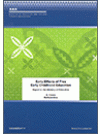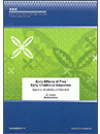20 Hours ECE is an education policy aimed at increasing participation in teacher-led services and eligible kōhanga reo by reducing the cost barrier to families. 20 Hours ECE also gives parents more choice about work and study which supports the Choices for Living, Caring and Working plan, and contributes to the government goal of Families, Young and Old. Under this policy, government funds up to six hours per day and up to 20 hours of early childhood education per week for three and four year old children (and some five-year olds) who attend teacher-led early childhood services. Funding is provided for up to 20 hours per week to encourage intensive participation in quality early childhood education.
Purpose
The focus of this study is on the early effects of 20 Hours ECE on participating services’ practices, policies, costs and revenues. The primary purpose of the study is to provide the Ministry with information on the early implementation of 20 Hours ECE which could lead to fine tuning of the operational policy settings, including the rules by which 20 Hours ECE operates.


